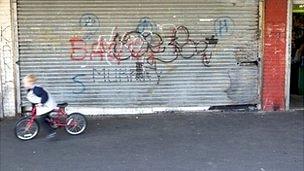Children 'already two years behind at start of school'
- Published

The report warns that neglected children begin school far behind and never catch up
Children from the poorest homes risk becoming an "educational underclass", starting school in nappies and behaving like toddlers, says research from the Centre for Social Justice.
The think tank says there are four-year-olds so far behind that they do not know their own names and have the social skills of a two-year-old.
The report says an "abysmal" start in life leaves pupils unready for school.
A head teacher told researchers of parents who "just can't be bothered".
The Centre for Social Justice (CSJ) study was produced by a panel of educationalists, chaired by Sir Robin Bosher of the Harris academy federation.
Bad parenting
It warns of children who arrive at school already far behind their classmates and who are too immature to begin learning lessons.
"In one school, some children at four years old are developmentally nearer to two when they start school," says Sir Robin.
This means that children need to be helped to catch up as quickly as possible, he says, which, rather than learning formal lessons, might be about being taught to use a knife and fork or to improve very poor language skills.
'We've known about the toilet training issue a long time'
Even after a year these pupils might still not be able to recognise that words are read from left to right, says the report.
These children have had such little experience of being sociable with others that they hurt other children and adults, says Sir Robin.
A head teacher told the researchers: "In the last three years we have had to toilet-train children who came to school in nappies at age five. Parents ask me how we managed to do it. Many of them just can't be bothered, they think it's our responsibility to do it for them."
They also described children at school who "don't even have the concentration to talk and say an answer in any kind of sentence".
The study talks of the impact of family breakdown on children and how much they can be damaged by instability in their home life.
The lack of a male role model in families is also described as a factor affecting pupils' behaviour.
"Emotional neglect" from disengaged parents is also a damaging factor for children's development, says the study. There are also 700,000 children living with parents who are "dependent drinkers" and 335,000 with "dependent drug users".
An unnamed head teacher told researchers that the label of special educational needs might be "often used as an excuse for low expectations and under-preparation on the part of parents".
The report warns that falling behind at the very beginning of school can be the starting point for permanent disadvantage.
"These children are starting school drastically behind the levels of development expected of their age," says the report.
The report highlights the particularly low attainment of white, working-class boys.
It says, for example, that only 26% of white boys on free school meals achieve five good GCSEs compared with 40% of black boys on free school meals.
"White, working-class boys are in danger of becoming an educational underclass," said the think tank's director, Christian Guy.
A Department for Education spokesman said: "This government is taking decisive action to support disadvantaged pupils and close the unacceptable attainment gap between them and their peers.
"We are increasing the pupil premium to £2.5bn a year and doubling the number of disadvantaged two-year-olds eligible for free nursery places to 260,000.
"We've turned round more failing schools than ever before and are setting up new free schools to give all parents, not just the rich, the choice of a good school."
- Published2 September 2013
- Published8 May 2013
- Published3 January 2013